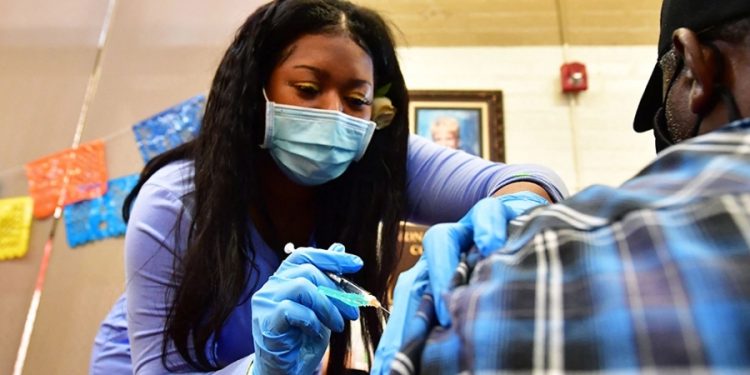🚗 Jerry Seinfeld revealed in an interview published today that the guest he was most nervous to interview across more than 80 episodes of his show “Comedians in Cars Getting Coffee” was former President Obama.
Today in health, the White House is making another concerted effort to encourage people to get the updated COVID-19 booster before the end of this year as vaccination rates stagnate.
Welcome to Overnight Health Care, where we’re following the latest moves on policy and news affecting your health. For The Hill, we’re Nathaniel Weixel and Joseph Choi. Someone forward you this newsletter?
White House looks to improve lagging vax numbers
The White House on Tuesday launched a six-week sprint aimed at convincing Americans to get their updated COVID-19 vaccine before the end of the year.
The administration said the focus of the campaign will be on seniors and vulnerable communities hardest hit by the virus.
“Please, for your own safety, for that of your family, get your updated COVID-19 shot as soon as you’re eligible to protect yourself, your family, and your community,” White House medical adviser Anthony Fauci said Tuesday.
Public health officials have repeatedly warned that the U.S. will likely face another wave of COVID-19 infections as the weather gets colder and people travel and gather for the holidays. White House officials had previously called for the public to get booster shots in time for Halloween.
The government has purchased 171 million doses of the updated vaccine. But well into November, uptake of the new booster shots has been extremely low, frustrating health experts and officials.
The administration said it will direct its limited remaining resources into a
$475 million campaign for community health centers and community-based organizations to increase the pace of vaccinations.
About 35 million people in the U.S. have gotten the updated shots, about 11 percent of those aged five and older, according to data from the Centers for Disease Control and Prevention.
Read more here.
Fauci makes final appearance in briefing room
The nation’s top infectious diseases doctor Anthony Fauci made his final appearance in the White House briefing room Tuesday as he prepares to leave government.
“I’ll let other people judge the value or not of my accomplishments, but what I would like people to remember about what I’ve done, is that every day, for all of those years, I’ve given it everything that I have and I’ve never left anything on the field,” Fauci said of his legacy.
“So if they want to remember me, whether they judge rightly or wrongly what I’ve done, I gave it all I got for many decades,” Fauci said.
The longtime health official has worked under seven presidents, serving 54 years with the National Institutes of Health and 38 years as the director of the National Institute of Allergy and Infectious Disease. But he surged to popularity as one of the leaders of the pandemic response during the Trump administration.
Throughout the pandemic, his guidance on masks and vaccines has drawn criticism and attacks from conservative lawmakers and officials.
Fauci bemoaned the rhetoric that turned vaccines and scientific recommendations political.
“As a physician, it pains me because I don’t want to see anybody get infected. I don’t want to see anybody hospitalized and I don’t want to see anybody die from COVID,” Fauci said. “Whether you’re a far right republican or a far left Democrat, doesn’t make any difference to me.”
A small part of a long career: Fauci said COVID-19 is “really, really very important” but called the pandemic “a fragment” of his work in the health space.
Not retiring: Fauci announced earlier this year that he would step down from his position by the end of President Biden’s time in office, but was quick to clarify that he was only retreating from his government role to “pursue the next chapter” in his career.
Read more here.
DC STUDENTS, STAFF MUST TEST NEGATIVE TO RETURN AFTER HOLIDAY
Students and staff returning to Washington, D.C., public schools after Thanksgiving break will have to provide proof of a negative COVID-19 test before they can get back to the classroom, city officials said.
Schools are distributing test kits in the days leading up to the holiday, and families can pick up extra tests at any of the District’s COVID Centers, located in each of the city’s eight wards.
The requirement, which D.C. schools have also used to ease returns to in-person learning after other seasonal breaks, is in practice this Thanksgiving “to support a safe return” after the holiday, according to the mayor’s office.
The tests need to be taken on Sunday, Nov. 27, and results must be uploaded the same day to the D.C. Public Schools online portal to clear the student for class on Monday.
Students and staff who test positive, regardless of vaccination status, won’t be allowed to return to in-person school activities until completing an isolation period, which is typically 5 days, unless symptoms persist, according to guidance from D.C. Health.
Read more here.
1 IN 4 WORRIED ABOUT CATCHING COVID AT WORK: GALLUP
The new poll, published on Tuesday, found that 26 percent of employed adults surveyed said they were “very” or “moderately” concerned about COVID-19 exposure at their workplace, marking a decrease of 7 percentage points from the 33 percent of respondents who said the same in a similar survey conducted in July.
Demographic differences:
Thirty-three percent of female respondents said they are worried about catching COVID-19 at their workplace in the new poll, while 21 percent of male respondents said they are.
Democrats surveyed were more likely to express concern than respondents of other political affiliations, with 38 percent of those identifying as Democrats saying they are worried about COVID-19 exposure at their workplace compared to 26 percent of independents and 9 percent of Republicans.
Smaller differences were found among age groups, with 29 percent of respondents who are 18 to 34 years of age saying they are worried about catching COVID-19 at their workplace, while 26 percent of respondents ages 35 to 55 and 22 percent of those ages 55 or older expressed the same concern.
The poll comes as COVID-19 cases in the U.S. have dropped since climbing in the summer, though many have expressed concerns about a potential surge in cases during the winter.
Read more here.
Omicron boosters better at preventing infection: CDC
New data from the Centers for Disease Control and Prevention (CDC) shows that the updated, bivalent COVID-19 boosters provided better protection against infection when compared to multiple doses of the original mRNA COVID-19 vaccines.
The study, conducted between September and November, analyzed more than 360,000 viral tests for adults. The tests came from nearly 10,000 retail pharmacy locations and only included adults who had symptoms of SARS-CoV-2 and did not have immunocompromising conditions.
Findings from the CDC study indicated that the bivalent booster shots from Pfizer and Moderna, made to specifically protect against the BA.4 and BA.5 omicron subvariants, provided stronger protection when those who received it were compared to people who only received two, three or four doses of the original monoclonal vaccine.
Among the individuals in the study who tested positive for COVID-19,
72 percent had received two, three or four doses of the monoclonal vaccine and 5 percent reported having received the bivalent booster.
The bivalent booster doses were authorized without human data, and the findings of the study represent some of the first reports of the shot’s efficacy.
The majority of the tests were conducted at a time when the BA.4 and BA.5 subvariants were dominant in the U.S. The most recent federal data now indicates that BA.5 accounts for roughly a quarter of cases, with its viral descendants BQ.1 and BQ.1.1 each making up about the same proportion of total infections.
Read more here.
WHAT WE’RE READING
A simple screening question could help millions of women prevent cardiovascular disease. Why aren’t we using it? (Stat)
Experts are concerned Thanksgiving gatherings could accelerate a ‘tripledemic’ (NPR)
Expect more fungal infections as their geographic ranges expand, experts warn (NBC News)
STATE BY STATE
Schools, Sheriffs, and Syringes: State plans vary for spending $26B in opioid settlement funds (Kaiser Health News)
Indy doctor received ‘threats’ after Rokita’s Fox News interview; attorneys spar in court (The Indianapolis Star)
Alabama cervical cancer rates, diagnosis remain among highest in US (AL.com)
That’s it for today, thanks for reading. Check out The Hill’s Health Care page for the latest news and coverage. See you tomorrow.















